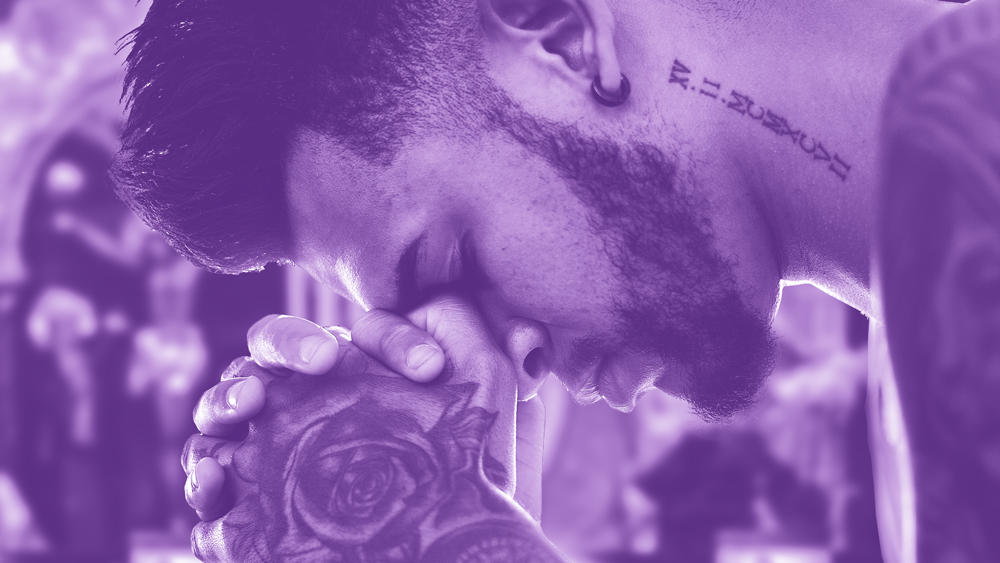Do I Need To Be Religious To Get Sober?
If you are toying with the idea of getting sober once and for all, or if you have just reached a milestone in your days of early sobriety, you might be under the impression that to live a lifestyle free of drugs, alcohol, and other addictive substances, you need to either be deeply religious or convert to Christianity, Islam, or Judaism in order to reap the gains of sobriety. After all, 73% of addiction treatment programs in the United States incorporate either religion or faith-based elements into their curriculum.
While it’s true that there are numerous drug and alcohol treatment programs that are based on religious frameworks and frequently incorporate religious principles, sayings, and even scriptures, you don’t actually have to be religious — or believe in any kind of higher power — in order to achieve sobriety. Read on to discover treatment options for atheists, agnostics, and believers alike.

Why Do Treatment Programs Seem So Religious?
Before diving into treatment options, it’s important to understand why most substance abuse treatment programs seem to be aimed at churchgoers — specifically of the Christian faith. Alcoholics Anonymous, a very well-known 12-step program, is based on Christian principles and assumes belief in a higher power in order to facilitate recovery. But what happens to you and your sobriety if you don’t believe in God? Can you still achieve sobriety? For those who don’t believe in the spiritual world, or for those who have had a bad experience either with members of a certain religion or a doctrine preached by a childhood church, religious adherence might be a turn-off to joining the program at all.
Additionally, due to the fact that AA was founded in 1935, it’s important to understand that the 12 steps of the program, as well as they work for some people, were based on the understanding of alcoholism at the time. Advances in psychology, neuroscience, and biology have proven alcoholism to be much more than the character flaw it purports it to be. There are many people who have been through the Alcoholics Anonymous program only to relapse, go back to the group, and relapse again. This article from the Atlantic details what it was like for someone to attend AA meetings, adhere to its doctrines, and ultimately feel as though his relapse was a failure of his own character rather than any kind of addictive tendency. AA has undoubtedly helped thousands of people recover from addiction, and spirituality is indeed the key to recovery for many, but it’s important to bring to light why you might feel out of place in such groups if you are not religious.

Treatment Programs for the Religious
Before you start to think that religion-based treatment programs for those suffering from alcoholism or addiction cling to outdated science, shame their members and adhere to a strict code of morality when it comes to drinking — think again. Though there are obvious problems in calling alcoholism or substance addiction a character flaw, there is a behavioral side to addiction. For example, did you know that in a 2010 study, it was found that several personality traits contribute to alcoholism?
The notion of an addictive personality is somewhat of a myth, but researchers found that on the Big 5 personality test traits of conscientiousness, agreeableness, and neuroticism were “significantly linked to alcohol involvement”.
Working within a religious framework — whether it be a 12-step program like AA or a Christian support group for recovering alcoholics — can be of great benefit to those who do believe in a higher power, and addressing the behavioral characteristics of addiction through the lens of your beliefs is undoubtedly helpful to many. Spirituality can influence behavior, thought patterns, and feelings about both life and your addiction. If you have a group of believers that can lift you up and support you on your journey to sobriety in addition to your individual faith, that’s even better.
Treatment Programs for the Non-Religious
If you know that a secular program is the right choice, rest assured that there are several options available to you. You might choose to attend an AA group knowing that others will be religious, and this is fine. You don’t have to believe in anything specific to attend. Other programs might still use a step-based methodology to provide you with a framework for getting clean — and why not? Using a linear timeline can make you feel as though you are checking milestones off your list and accomplishing different facets of your sobriety. Asking others for forgiveness for past wrongs, incorporating community and accountability into your recovery through the sponsorship method (in which a veteran of the group mentors a new member), and making a “searching and fearless moral inventory” of yourself will most likely further your sobriety instead of stalling it. It’s those steps that call on God, or a higher power, to remove your character flaws and desire to drink that might not ring true for you.
If you find that the religious aspect is hindering your sobriety or distracting you from your purpose there, it might be time to look elsewhere for treatment. If you are set on finding a program that does not utilize any form of belief, for example, look for a support group online, contact your family doctor, local hospital, or treatment center for a recommendation. There are actually several options for substance abuse treatment that are not based on religion.
Which Treatment Program Should I Choose?
You might have a good idea of which programs you like and which you don’t, or you might be completely baffled at this point as to which program will help you become sober once and for all. That’s understandable. Just remember, you don’t have to make a decision for your entire life right now: If you choose a program and you feel your sobriety slipping, or you feel that the energy of the room is very negative every time you attend a meeting, there’s no shame in leaving to find something better. This is about your recovery — not anybody else’s.
What Can I Do if Someone Puts Down My Decision?
Sobriety is hard enough to achieve without a family member, friend, or pastor adding their input as to which kind of recovery program you should choose. It’s one thing for a well-meaning parent or spouse to encourage your treatment and give you information on AA groups, but it’s another to shun someone’s decision to join a non-religious treatment program (or a religious one, depending on your background). Be respectful when listening to others’ words of advice, especially if you know they are just trying to help you, but remind them that the most important thing right now is that you are trying to get sober. Whichever treatment program helps you do that is the right one for you.
It’s important to note that 50-90% of those in rehab will eventually relapse, and 90% of those who need treatment in a drug rehab program do not receive help in the first place. If you need to talk to someone about treatment options, or if you would like a second opinion as to which kind of treatment program you should choose for your recovery, contact Clean Recovery Centers to discover more judgment-free information about treatment programs for both religious and non-religious individuals.
SOURCES:
- https://www.aa.org/pages/en_US/historical-data-the-birth-of-aa-and-its-growth-in-the-uscanada
- https://www.asam.org/Quality-Science/publications/magazine/read/article/2014/03/13/addiction-character-defect-or-chronic-disease
- https://www.theatlantic.com/magazine/archive/2015/04/the-irrationality-of-alcoholics-anonymous/386255/
- https://www.verywellmind.com/secular-alcohol-and-drug-rehab-programs-67702
- https://www.ncbi.nlm.nih.gov/pmc/articles/PMC3002230/
- https://en.wikipedia.org/wiki/Big_Five_personality_traits


